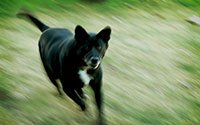Woodland Hills personal injury attorney Barry P. Goldberg handles several significant dog attack cases every year. Most people know that in California, the dog owner is strictly liable for dog bite injuries. However, most people do not know that a property owner or manager has a duty to warn of a dangerous condition on the property, namely, a vicious dog. The property owner or manager will be held liable if they knew or should have known of a dog’s dangerous propensities. Clearly, dog bite cases require “special handling.”
This “non-strict liability” theory is really a straight question of negligence. A claim for negligence consists of “‘(1) a legal duty to use reasonable care, (2) breach of that duty, and (3) proximate [or legal] cause between the breach and (4) the plaintiff’s injury. [Citation.]’ [Citation.]” (Phillips v. TLC Plumbing, Inc. (2009) 172 Cal.App.4th 1133, 1139.) The relationship of a property owner or manager and the dog owner who rents or leases space may be governed or limited by the rental agreement. Notwithstanding the rental agreement, a reasonable property owner/manager must use reasonable care once it appears that there is a dangerous animal on the premises. In addition, a reasonable property owner/manager may obtain information during visits or inspection of the property.
In Uccello v. Laudenslayer (1975) 44 Cal.App.3d 504, the court recognized exceptions to the general rule that a landlord has no liability for a dangerous condition that arises after the tenant takes possession. Uccello observed that “[a] common element in these exceptions is that either at or after the time possession is given to the tenant the landlord retains or acquires a recognizable degree of control over the dangerous condition with a concomitant right and power to obviate the condition and prevent the injury. In these situations, the law imposes on the landlord a duty to use ordinary care to eliminate the condition with resulting liability for injuries caused by his failure so to act.” (Id. at p. 511.) As explained in Portillo v. Aiassa (1994) 27 Cal.App.4th 1128, “[w]here there is a duty to exercise reasonable care in the inspection of premises for dangerous conditions, the lack of awareness of the dangerous condition does not generally preclude liability.” (Id. at p. 1134.) “‘Although liability might easily be found where the landowner has actual knowledge of the dangerous condition “[t]he landowner’s lack of knowledge of the dangerous condition is not a defense. He has an affirmative duty to exercise ordinary care to keep the premises in a reasonably safe condition, and therefore must inspect them or take other proper means to ascertain their condition. And if, by the exercise of reasonable care, he would have discovered the dangerous condition, he is liable.”’” (Ibid.)
Contrary to a common defense position, knowledge of dangerousness does not necessarily have to come from a history of bites. Often reasonable knowledge of dangerousness can be observed. Dangerous breeds on the property, Beware of Dog signs, reinforced fencing, chewed up items and aggressive barking may be sufficient to establish knowledge of dangerousness. If you have been attacked by a dangerous dog, we recommend that you consult with an experienced dog attack lawyer. An experienced dog attack lawyer may be able to obtain adequate compensation from sources in addition to the actual dog owner.








